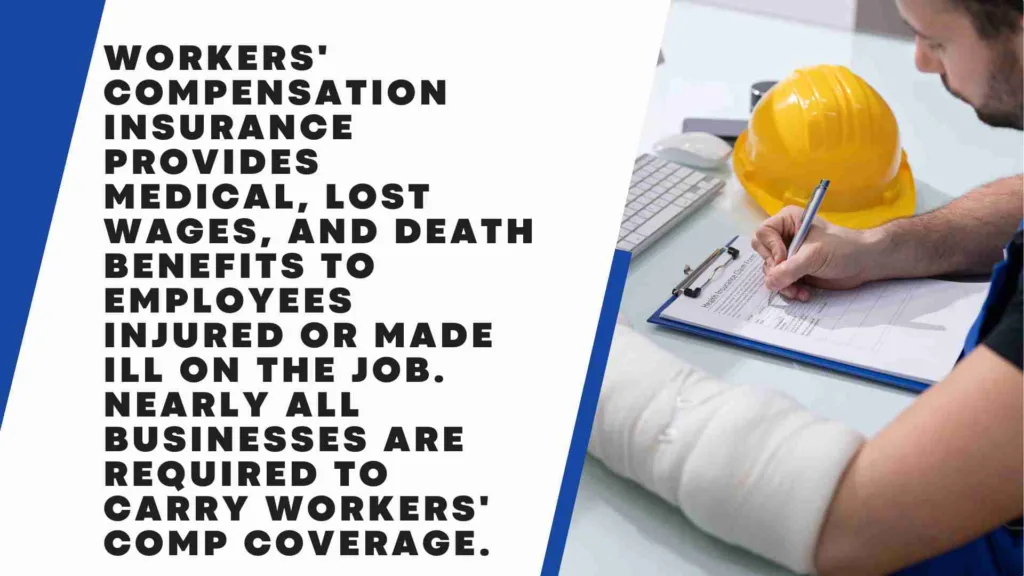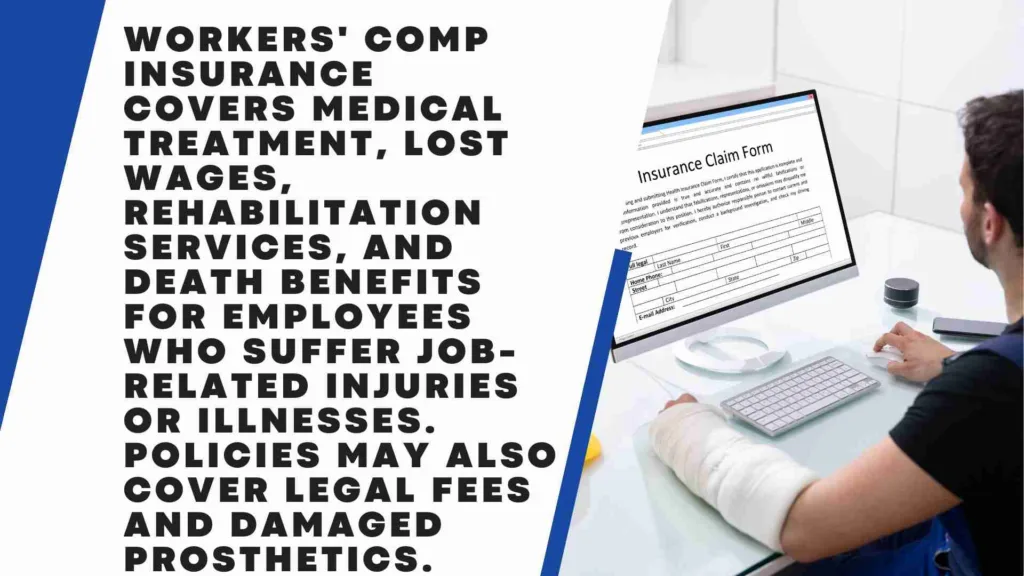In 2023, workers’ compensation insurance will continue to play a vital role in safeguarding employees and employers. This essential coverage provides medical and wage benefits to workers injured or falling ill, ensuring their well-being during recovery.
Employers benefit from the protection it offers against potential lawsuits related to workplace accidents. As state regulations evolve, it becomes increasingly crucial to comprehend the benefits and specific coverage requirements of workers’ compensation insurance.
This article delves into the intricacies of this insurance, highlighting its significance in maintaining a secure and supportive work environment.
Table of Contents
What is Workers’ Compensation Insurance?

Workers’ compensation insurance compensates employees injured or ill due to their job. This insurance covers medical expenses, lost wages, rehabilitation, and death benefits if the injury results in death.
Workers’ compensation laws may vary by state but generally require businesses with employees to buy workers’ compensation coverage. This insurance protects both employees and employers in the event of work-related illnesses or injuries.
Who Needs Workers’ Compensation Insurance?

Most private employers with employees are legally required to carry workers’ compensation insurance in the U.S. This includes full-time, part-time, seasonal workers, and in some states, subcontractors and temporary employees.
Independent contractors and sole proprietors typically don’t need workers’ comp. However, they may buy a policy to cover injuries while working.
What Does Workers’ Compensation Insurance Cover?

Workers’ compensation insurance can cover a wide range of benefits for employees injured on the job. Some key benefits include:
- Medical expenses – Pays for doctor visits, hospitalization, surgery, physical therapy, prescriptions, and other medical care related to workplace injury.
- Lost wages – Provides a portion of an injured employee’s wages (typically 2/3) if they miss work due to the injury.
- Permanent disability – Offers payments if the injury causes permanent impairment that impacts job performance.
- Death benefits – Pays benefits to surviving spouses and dependents if a work-related injury results in death.
- Rehabilitation services – Covers job training and counseling to help injured employees return to work.
Coverage and benefits can vary significantly by state. Consult your state’s laws and guidelines when getting workers’ comp quotes.
How Much Is Workers’ Compensation Insurance?
Workers’ compensation insurance price depends on several risk factors:
- Payroll – Companies with higher payrolls pay more in premiums.
- Industry risk – Businesses in high-risk industries like construction pay higher rates.
- Claims history – Frequent claims may increase an employer’s premiums.
- State rules – Rates are regulated and vary widely by state.
On average, rates range from $0.77 per $100 of payroll in North Dakota to $2.32 per $100 in California. Small businesses can expect to pay $10,000 or more annually for workers’ comp.
Should Businesses Buy Workers’ Comp from a Private Insurer or State Fund?
Businesses can buy mandatory workers’ compensation insurance from:
- Private insurance companies – Most states allow private insurers to offer policies. Rates are based on risk factors.
- State insurance funds – Some states have a state-run insurance fund as an alternative option. Rates may be lower.
Six states – North Dakota, Ohio, Washington, Wyoming, Nevada, and West Virginia – require coverage through state funds rather than private insurance. Check your state’s guidelines to see if you have an option.
Can Businesses Self-Insure Workers’ Comp?

Larger employers may be eligible to self-insure workers’ compensation in some states rather than buying a policy. Self-insured employers take on the financial responsibility of covering claims directly instead of paying premiums.
To qualify for self-insurance, businesses typically need:
- Minimum of 300 employees
- Consistent cash flow
- A net worth of $5 million
Self-insuring can save money over time but involves more risk and administration. Approval is required from the state’s Department of Insurance.
FAQs About Workers’ Compensation Insurance
Can I buy workers’ comp insurance from any insurance company?
Yes, you can buy mandatory workers’ compensation coverage from any private insurance company licensed in your state. You can work with an independent agent or insurer directly.
How much does workers’ compensation insurance cost?
Workers’ comp insurance rates vary significantly by state, industry risk, payroll size, and claims history. Costs typically range from $ 1 to $3 or more per $100 of payroll.
Does workers’ comp cover pre-existing conditions?
Yes, workers’ compensation insurance covers injuries and illnesses arising from the job regardless of pre-existing conditions. However, benefits may be lower if a pre-existing condition is partially at fault.
Are subcontractors covered under workers’ compensation insurance?
It depends on state law. Many states exclude subcontractors, who would need their own policies. Some require coverage for subcontractors under the hiring business’s policy. Check your state’s statutes.
Can I provide different benefits for different types of injuries?
No. Workers’ compensation insurance covers all valid work-related injuries and illnesses. Benefits are standardized and can’t be adjusted per claim.
Does workers’ compensation protect employers from lawsuits?
Yes. Workers’ compensation Insurance is the “exclusive remedy” for workplace injuries. Employees cannot sue their employer over an incident already covered by workers’ compensation benefits.
Does workers’ comp coverage include death benefits?
Yes, state workers’ comp systems require death benefits paid to surviving spouses and dependents if a work injury results in death.
Can I buy workers’ compensation insurance for myself?
Sole proprietors and business partners are not required to carry workers’ compensation insurance on themselves in most states but can elect it voluntarily.
When is my workers’ comp premium due?
Premiums are typically paid either monthly or quarterly over the policy term. Your first premium is often due at policy issuance.
Is there a deductible for workers’ comp claims?
Deductibles are uncommon in workers’ comp policies. However, some states allow deductibles on medical benefits with limits. Check your policy.
What is Meant by workers’ compensation insurance?
Workers’ compensation insurance is a type of insurance that provides coverage for employees who are injured or become ill due to their jobs. It is designed to provide injured workers with medical benefits, wage replacement, and other necessary services.
Do business owners need workers’ compensation coverage?
In most states, business owners are required by law to provide workers’ compensation coverage for their employees. This coverage helps protect employees and business owners in the event of a work-related injury or illness.
Can independent contractors purchase workers’ compensation insurance?
Independent contractors are typically not covered by workers’ compensation insurance. However, some independent contractors may have the option to purchase workers’ compensation coverage for themselves.
What benefits and services are covered under a standard workers’ compensation insurance policy?
Workers’ compensation insurance covers a range of benefits and services, including medical treatment, wage replacement, disability benefits, vocational rehabilitation, and death benefits. The specific coverage may vary depending on the state and the insurance policy.
How do workers’ compensation claims work?
When an employee is injured or becomes ill due to their job, they can file a workers’ compensation claim with their employer. The employer will then notify their insurance company, who will investigate the claim and determine if it is compensable. The injured employee can receive the necessary benefits and medical treatment if approved.
Does workers’ compensation pay for lost wages?
Yes, workers’ compensation insurance can provide wage replacement benefits for employees who cannot work due to a work-related injury or illness. This can help replace a portion of their lost wages while they recover.
Are workers’ compensation benefits free for injured workers?
Workers’ compensation benefits are not free for injured workers. The cost of these benefits is typically covered by the employer’s workers’ compensation insurance policy. However, the injured worker may still have to pay certain deductibles or co-pays for medical treatment.
What are the workers’ compensation laws in 2023?
Workers’ compensation laws can vary from state to state and change over time. It is important to consult with your state’s Department of Labor or a legal professional to get the most up-to-date information about workers’ compensation laws in your area.
What is the role of the National Council on Compensation Insurance (NCCI)?
The National Council on Compensation Insurance (NCCI) is an organization that collects and analyzes data on workers’ compensation insurance. They provide statistical information, rate recommendations, and other resources to help insurance companies and regulators make informed decisions about workers’ compensation coverage.
What happens if a business does not have workers’ compensation coverage?
If a business does not have workers’ compensation coverage when required by law, it may face penalties and fines. Additionally, suppose an employee is injured on the job, and the business does not have coverage. In that case, the injured worker may be able to pursue legal action against the business for compensation.
Key Takeaways
- Nearly every business with employees must carry workers’ compensation insurance. It protects your staff and your company.
- Shop insurance quotes carefully – rates can vary greatly between private insurers and state funds depending on your location and risk factors.
- Understand the benefits covered in your state and educate employees. Prompt reporting and medical care lead to better outcomes.
- Enforce workplace safety standards to help avoid injuries and claims that increase your premiums. Prevention is critical.
- Consider self-insurance as your company grows to save on premiums long-term. Get state approval before handling claims in-house.
Workers’ compensation insurance laws, rates, and requirements can be complex. Please consult a licensed insurance agent or your state’s insurance department if you have additional questions about getting the right workers’ comp coverage for your business.
- Does M&S Do Car Insurance? A Full Guide In 2024 - April 15, 2024
- Pet Insurance for Older Dogs: 2024 Full Guide & Top Providers - March 17, 2024
- Small Business Equipment Breakdown Insurance: Full Coverage - November 6, 2023

